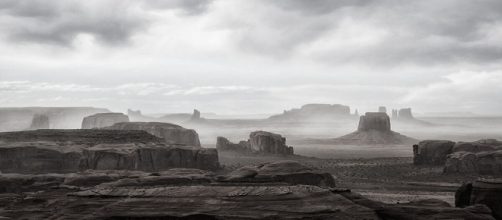Climate change is the hard news story of our every day now. Natural disasters plaguing the planet – fires, floods and drought – are making art news with two events.
Art and science
The Smithsonian Institute reports an exhibit of contemporary art at the National Museum of Natural History. Titled “Unsettled Nature,” the display pictures nature taking hits from human behavior, and poses the question, “what is natural” when the world is so impacted by people?
National Museum of Natural History curator Scott Wing got together with Smithsonian American Art Museum curator Joanna Marsh to mount an exhibit this week telling the story of climate change in a fresh way.
Wing, who studies fossils to discover earth’s past climate, is quoted in the museum press release saying that scientists need to find ways to communicate with the public: “We thought art and science together might be a more powerful way of affecting people's emotions as well as their intellect.”
Hard truths
The exhibition, titled “Unsettled Nature,” is meant to remind people that they are unsettling nature. Wing and Marsh picked artists with inventive ways to challenge the public conscience. Modeling this idea is Bethany Taylor’s woven tapestry of the burning Amazon rainforest hung next to a fire extinguisher. Wait, there's more.
Around her tapestry she mounted animal forms linked by string. “It's almost like if you pull one string, they'll all unravel,” Taylor said.
“I love that metaphor of interconnection.”
The other art news on the subject of earth’s problems was the announcement of finalists in the annual Wellcome Photography Prize competition – 90 artists from 15 countries in all. Winners to be announced on July 28 via YouTube.
World health
Wellcome is an independent charitable foundation supporting science to solve the urgent health challenges facing everyone. The Wellcome photography competition, now in its third year, is themed in three areas of world health: mental health, global heating and infectious diseases.
Of course, it could be argued that mental health, global heating and infectious diseases are not separate issues. Acknowledging this, the Wellcome press release points out that our ever-heating world not only means wildfires and lack of drinking water that leads to disease, but that it also results in skin cancer.
Of particular interest for this column is the photography showing the calamitous effects of climate change on nature. According to the Wellcome press release, the photographers who have been short-listed aim t tell that story.
Public awareness
Given that global heating is a difficult health problem to solve without public support, Wellcome says that having artists pictorialize the story can drive home this issue. One of the shortlisted photographers is Krisztián Bócsi of Germany for his picture titled Eliminating Fossil Fuels. In it, you see what amounts to a before and after shot – a verdant scene with an approaching fire in the distance.
“The faster the world can cut greenhouse emission, Bócsi said in his mission statement, “the better we’ll be able to avoid the health dangers posed by global warming.” He can take pride in his government.
Germany has committed to eliminating coal use by 2038.
But wait, even if every country does the same, we’ll still be adversaries in the natural world. I’m thinking of a National Public Radio reported in May saying that a billion birds die each year from colliding with skyscrapers. I’m just saying.


